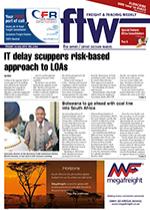Africa’s aspirations to establish a common market that will dwarf other freetrade areas could be dead in the water if it doesn’t sort out on-the-ground issues first, customs and excise professional Duane Newman has said. Speaking at the recent Manufacturing Indaba in Sandton, the joint managing director of Cova Advisory & Associates said their private sector clients all appeared to be asking the same questions when it came to cross-border freight. “They want to know why their goods are getting stopped, how to get their goods released if they are stopped, and why they continue getting stopped even when they’re playing by the rules.” Participating in a panel discussion that looked at “growing an African marketplace” within the current context of the African Continental Free Trade area (AfCTFA), Newman indicated that holdups at customs across SADC and elsewhere in Africa, many of them irregular, did not bode well for the continent’s much- vaunted trade liberation efforts. “What it encourages,” he warned, “is for law- abiding multinational companies to become not law abiding. “They start wondering whether for them to get their goods through, they have to start bribing customs officials.” He stressed it was particularly the case for large commercial concerns freighting time-sensitive goods such as perishables that were part of agricultural value chains. That was the view on the ground, Newman said, taken from interactions he and his associates had held with individual private sector clients. “It also impacts on how Africa is getting benchmarked in terms of tariff rates and broader customs procedure.” In a nutshell, there clearly is a big problem at a practical level. “You can have duty-free access to a market but if you can’t get goods through a trade block it becomes purely academic.” In fairness to customs regimes and representatives across the region, Newman added that it was comforting to notice greater willingness to iron out cross-border hiccups. “There is a lot more open dialogue between business and government around tax authorities not only being responsible for collecting tax, but also for facilitating trade.” For AfCFTA to work, he said, authorities would have to ensure that the basic building blocks were in place so that benefits would accrue from the moment the zone was implemented. You can have dutyfree access to a market but if you can’t get goods through a trade block it becomes purely academic. – Duane Newman

